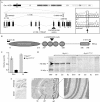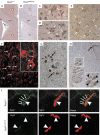Mutation in the Scyl1 gene encoding amino-terminal kinase-like protein causes a recessive form of spinocerebellar neurodegeneration
- PMID: 17571074
- PMCID: PMC1905899
- DOI: 10.1038/sj.embor.7401001
Mutation in the Scyl1 gene encoding amino-terminal kinase-like protein causes a recessive form of spinocerebellar neurodegeneration
Abstract
Here, we show that the murine neurodegenerative disease mdf (autosomal recessive mouse mutant 'muscle deficient') is caused by a loss-of-function mutation in Scyl1, disrupting the expression of N-terminal kinase-like protein, an evolutionarily conserved putative component of the nucleocytoplasmic transport machinery. Scyl1 is prominently expressed in neurons, and enriched at central nervous system synapses and neuromuscular junctions. We show that the pathology of mdf comprises cerebellar atrophy, Purkinje cell loss and optic nerve atrophy, and therefore defines a new animal model for neurodegenerative diseases with cerebellar involvement in humans.
Figures



References
-
- Blot S, Poirier C, Dreyfus PA (1995) The mouse mutation muscle deficient (mdf) is characterized by a progressive motoneuron disease. J Neuropathol Exp Neurol 54: 812–825 - PubMed
-
- Humbert S, Saudou F (2006) The ataxia-ome: connecting disease proteins of the cerebellum. Cell 125: 645–647 - PubMed
-
- Kato M, Yano K, Morotomi-Yano K, Saito H, Miki Y (2002) Identification and characterization of the human protein kinase-like gene NTKL: mitosis-specific centrosomal localization of an alternatively spliced isoform. Genomics 79: 760–767 - PubMed
-
- Lein ES et al. (2007) Genome-wide atlas of gene expression in the adult mouse brain. Nature 445: 168–176 - PubMed
-
- Lim J et al. (2006) A protein–protein interaction network for human inherited ataxias and disorders of Purkinje cell degeneration. Cell 125: 801–814 - PubMed
Publication types
MeSH terms
Substances
LinkOut - more resources
Full Text Sources
Molecular Biology Databases

